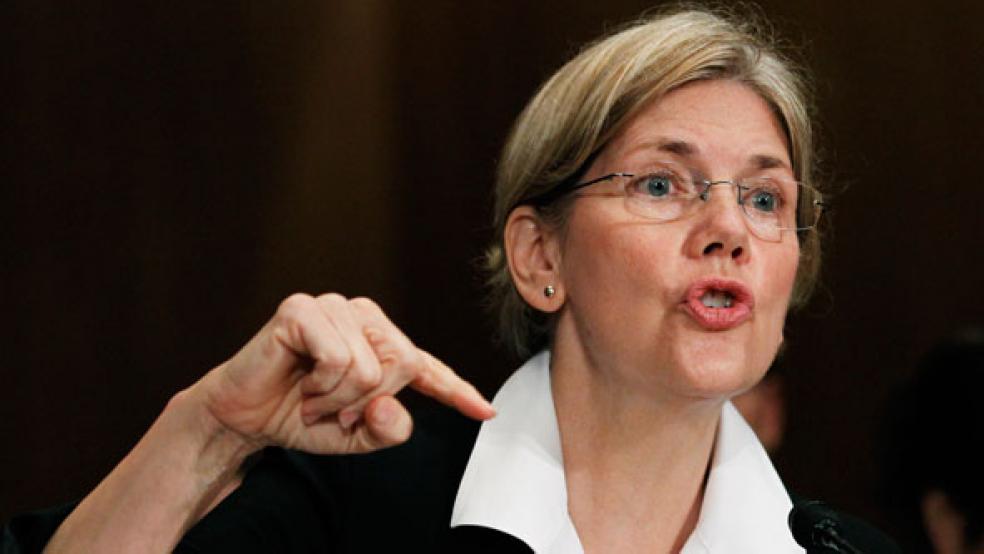Right about now, Republicans in Congress may be wishing that they had let President Barack Obama appoint Elizabeth Warren as the first head of the Consumer Financial Protection Bureau, the organization that is her brainchild. They won the battle – preventing her appointment to that job – but seem to have lost the war, as Warren won a Senate seat last month. Now, Senate Majority Leader Harry Reid (D-NV) is said to be intent on adding her to the roster of Democrats on the Senate’s powerful Banking Committee.

Warren joins the Senate just as Barney Frank – another Massachusetts Democrat, one of the most influential members of the House Financial Services Committee and co-author of the much-hated Dodd-Frank bank reform legislation – leaves. But for Republicans and bankers, replacing Frank with Warren might be more than just replacing one ideological adversary with another.
Warren is a pragmatist and a lawyer, more reserved than Frank and more cautious (albeit less witty) in her public pronouncements. Odds are that centrist Republicans will find her collegial. That’s one threat to those who remain vehemently opposed to further implementation of the Dodd-Frank reforms or any other banking regulation.
As a member of the Senate committee, Warren would have a hand in crafting new rules or closing perceived gaps in existing ones. She could simply use her stature to push for more sweeping reforms (breaking up the big banks, say) or to fight back against those who want to block future changes, such as, say, taxing carried interest at the same levels as regular income. (Currently, it is taxed at a much lower level, a fact that has helped make multi-millionaires and billionaires of many buyout fund managers.)
She may be a neophyte in the halls of Congress – she hasn’t even been sworn in yet – but Warren commands respect for her critique of Wall Street. That has populist appeal across party lines among the electorate. Republican lawmakers may have sneered when she declared at the Democratic National Convention this year that “the system is rigged” and blasted Wall Street CEOs for continuing to “strut” around Washington “demanding favors, and acting like we should thank them.” But that message may resonate with grassroots GOP voters, even if they differ in their prescriptions to solve the problem.
It’s hardly surprising that Democrats would want Warren in a place where she can best deploy her extensive knowledge of Wall Street and of financial legislation, honed during the battle to create the Consumer Financial Protection Bureau. Nor is it surprising that Wall Street lobbyists are said to be battling against her joining the Banking Committee. She’s a far greater threat to their interests than Chuck Schumer, the New York Democrat who has earned the title of the Senator from Wall Street, reflecting the fact that Wall Street donations to Schumer consistently have dwarfed those to any other candidate on either side of the aisle.
Still, Warren’s opponents may be wrong to view her as anti-bank. She isn’t talking publicly about what she may do specifically in her new role as Senator and in her possible future position as a member of the Banking Committee. Still, looking back to a conversation I had with her in the summer of 2009, there are some interesting indicators.
First of all, she was adamant that she wants a free market to work; that legislation should achieve that. One of the problems with the system leading up to the financial crisis was that “the market was broken,” she argued. The evidence of that, Warren says, could be seen in banks’ efforts to obscure the fact that mortgage and credit card contracts were set up to be hard for the average consumer to understand – and to maximize banks’ profits.
Multi-million dollar advertising campaigns by the big banks reinforced their dominance in the market and ensured that the playing field between big and small banks was anything but level. In that kind of environment, with banks focused on creating “tricks and traps buried in the fine print” for consumers, it’s hard for financial institutions to create genuinely innovative financial products that are useful for consumers and can generate profits for their creators. Smaller banks, community banks and credit unions are the victims of this system.
Odds are that the advocates of breaking up the biggest banks will find in Warren one of their most powerful supporters. But they shouldn’t expect her to initiate legislation aimed at forcing the likes of JPMorgan Chase (JPM) and Citigroup (C) to unwind themselves within the next year or two. Warren is smart enough to know how to operate in Washington and to realize that before pushing through any radical plans she’ll need to forge new alliances with those who today view her as a liberal who views any new regulation as a good thing.
Her ability to do that is likely to be a risk in the eyes of Wall Street, as is the fact that rather than focusing narrowly on specific agenda items – taxing carried interest, implementing the Volcker rule or Dodd-Frank provisions – she is likely to emphasize a broad mission: reminding the public and her new Senate colleagues that Wall Street’s goal is to serve Main Street, not profit while the broader public struggles. “We’re Americans,” Warren told the convention last summer. “We celebrate success. We just don’t want the game to be rigged.”






